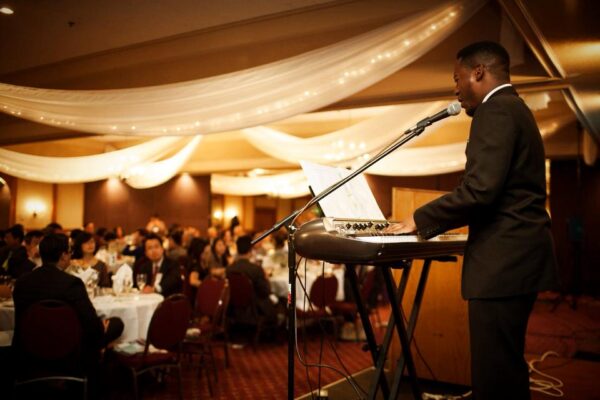This is an edited excerpt of an essay that originally appeared on Christian Brown’s blog. Read the full post, “It’s Time I Told You I’m Gay,” where he also grapples with the Bible.
When my best friend got married in 2009, I was thrilled when he chose me as his best man.
It was an honor to stand by his side at the altar and support him as his beautiful bride walked gracefully down the aisle to wed him.
I’ll never forget the flashes of joy on his face as she drew closer and closer. First, a grin and a giggle, then tears, plenty of tears.
Many things were running through my head at that moment, but there’s one thought in particular that still haunts me today.
“I’ll never get to experience this joy because I’m a gay Christian.”
I’ve never shared this thought publicly before. For years I’ve hidden my true sexuality in order to avoid this conversation. I was afraid of losing friends, family members, and church membership, but even as the Supreme Court provided marriage equality nationwide this week, I feel like I must speak out. I have to tell the truth.
I’ll never be happy unless I embrace both my sexuality and my Christian faith, even if it means getting the Church welcome mat pulled right from under my feet.
that I love to worship God.
And I did it with all my heart.
While the issue of affirming the LGBT community is still splitting up Christian leaders, I can say on a personal level, the issue has always divided me.
Ever since I was 12-years-old, I knew. I liked other boys. An unsettling discovery for any young black kid growing up with an absent father and a strict, religious mother.
But what crushed me the most was the fact that I knew God hated homosexuality. Although it was never said directly, I learned early on where all these unrepentant people went – hell.
My upbringing in the Pentecostal church taught me that God loved everyone, but sinners who did not know Jesus had their place in the lake of fire. First on the list were atheists and homosexuals.
You can imagine the impact this teaching had on me. I sought every cure I could find. I prayed and fasted earnestly every night that God would heal me of these “nasty attractions.” I watched testimonies of “ex-gay” Christians who overcame same-sex attractions and became heterosexual.
“Lord, please let it happen to me.”
I joined ex-gay ministries online and received counseling from ministers who encouraged me to shed any gay identity and see myself as a “son of the King.”
Along the way, I dated women “in faith,” believing that my attractions would change once I met the right girl.
The result? Nothing. Nada. My attractions never changed, but one thing did change as a result of me trying to eradicate my homosexuality, I slowly began to hate myself.
Depression began to set in. I became verbally abusive towards myself using words I dare not repeat here. I knew I was a Christian, a part of God’s family, but I wanted to end my life.
Suicide was an option for me, just like it is for so many LGBT youth unfortunately.
This is where I have to thank God. Contrary to what some might think, God does love the LGBT community, and His sacrifice on the cross transcends race, gender and sexuality. The Bible says if we only call upon the Lord we will be saved.
If it wasn’t for that hope, which I found in Jesus Christ, I know I’d be dead. But through the anger and emptiness, God was there – and I found solace in knowing that one day things would get better.
Being gay didn’t stop the fact that I love to worship God. And I did it with all my heart.
I decided to stop fighting my attractions and just accept them. But what would that mean for my future? I was left with two options: committing to lifelong celibacy or affirming same-sex relationships.
I cannot imagine a life being celibate forever. Is it because I’m lustful and can’t live without sex? No. It’s because I’m human and can’t live without companionship.
A recent Time Magazine article by Elizabeth Dias highlighted evolving attitudes on LGBT inclusion in the evangelical church, but it overlooked an important point – most Christians haven’t had a change of heart.
Using statistics from the Public Religion Research Institute, Dias highlighted the growing acceptance of gay marriage among young evangelicals, a bloc that doubled its support from just 20 percent in 2003 to 42 percent last year.
However, that doesn’t mean too much when more than 30 percent of the U.S. church world is 60-years-old and older. In fact, a Duke University study shows that 61 percent of America’s churches are led by a clergyperson over the age of 50.
Those numbers don’t bode well for LGBT inclusion when just 42 percent of Americans 65 and older think gay marriage should be legal.
That’s the lowest level of support compared to any other U.S. age group.
What does that mean for thousands of gay Christians? Coming out in support of same-sex relationships is a surefire way of being rejected by the American Church.
What does that mean for me? If there are no other solutions from the evangelical church on this, I will consider the possibility of a gay relationship (though I’m not in one nor seeking one now).
I’m likely to face immediate rejection from friends and family, but I’m not afraid.
God loves and accepts me. And it’s high time I did the same.
Click here to read the whole piece at Digital Dispatcher.
Photo Courtesy of Christian Brown.
Christian Brown is a guest contributor with the USC Center for Religion and Civic Culture.





